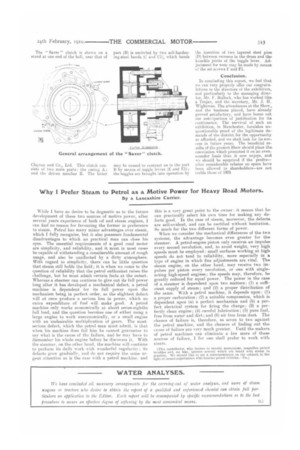Why I Prefer Steam to Petrol as a Motive Power for Heavy Road Motors.
Page 27

If you've noticed an error in this article please click here to report it so we can fix it.
By a Lancashire Carrier.
While I have no desire to be dogmatic as to the future development of these two sources of motive power, after several years experience of both oil and steam engines, can find no reason for favouring the former in preference to steam. Petrol has many minor advantages over steam, which I fully recognize, but it also possesses fundamental disadvantages to which no practical man can close his eyes. The essential requirements of a good road motor are simplicity, and reliability, and it must in most cases be capable of withstanding a considerable amount of rough usage, and also be unaffected by a dirty atmosphere. With regard to simplicity, there can be little question that steam still holds the field ; it is when we come to the question of reliability that the petrol enthusiast raises the challenge, but he must admit certain facts at the outset. Whereas a steamer can continue to give out its full power long after it has developed a mechanical defect, a petrol machine is dependent for its full power upon the mechanism being in perfect order, as the slightest defect will at once produce a serious loss in power, which no extra expenditure of fuel will make good. A petrol machine only works economically at about seven-eighths full load, and the question becomes one of either using a large engine to work uneconomically, or a small engine with an undesirable multiplication of gears. The mostserious defect, which the petrol man must admit, is that when his machine does fail him he cannot guarantee to say what is the cause of the failure, and he may have to dismember his whole engine before he discovers it. With the steamer, on the other hand, the machine will continue to perform its daily work with wonderful regularity its defects grow gradually, and do not require the same urgent attention as is the case with a petrol machine, and
this is a very great point to the owner : it means that he can practically select his own time for making any defects good. In the case of steam, moreover, the defects are self-evident, and can be rectified without hesitation. So much for the two different forms of power.
W hen we consider the mechanical differences of the two systems, the advantage becomes even greater for the steamer. A petrol-engine piston only receives an impulse every second revolution, and, to avoid weight, very high speeds must be employed: small surfaces working at high speeds do not tend to reliability, more especially in a type of engine in which fine adjustments are vital. The steam engine, on the other hand, may receive two impulses per piston every revolution, or one with single acting high-speed engines ; the speeds may, therefore, be greatly reduced for equal power. The power in the case of a steamer is dependent upon two matters; (1) a sufficient supply of steam ; and (2) a proper distribution of the same. With a petrol machine, it depends upon: (l) a proper carburation ; (2) a suitable compression, which is dependent upon (a) a perfect mechanism and (b) a perfect electrical system for firing the charge; (3) a perfectly clean engine; (4) careful lubrication ; (5) pure fuel, free from water and dirt; and (6) air free from dust. The ehance of failure is, therefore, as seven to two against the petrol machine, and the chances of finding out the cause of failure are very much greater. Until the makers of petrol machines can eliminate a few more of these sources of failure, I for one shall prefer to work with steam.
contributor, who desires to remain anonymous, magnifies petrol troubles and, we fear. ignores several which are found with steam in practice. We should like to see a correspondence on the subject, in the light of recent experiences with heavier petrol vehicles. —En.]








































